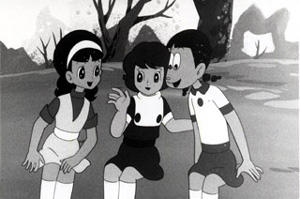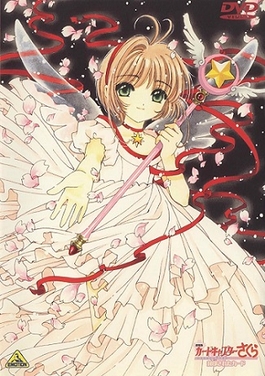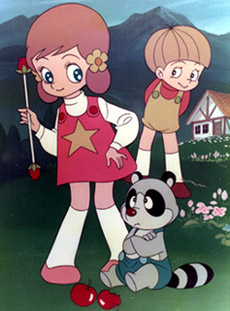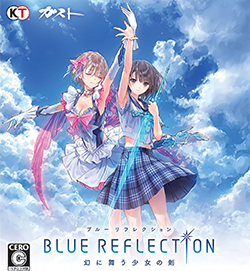
Sally the Witch, originally titled Sunny the Witch, is a Japanese manga series written and illustrated by Mitsuteru Yokoyama. It was serialized in Shueisha's monthly Ribon magazine from July 1966 to October 1967. Its 1966 anime adaptation was one of the most popular magical girl series of what would eventually become a genre in Japan. Due to its characteristics, it may be considered the first shōjo anime as well; while titles such as Himitsu no Akko-chan predate Sally in manga form, the Sally anime predates Himitsu no Akko-chan's, which came out in 1969.

Tweeny Witches is a Japanese anime television and original video animation series. Produced by Studio 4°C, the series is directed by Yoshiharu Ashino and written by Shinji Obara. Inspired by Through the Looking-Glass, the story follows a young human girl who finds herself trapped in a magical world filled with witches, warlocks, and fairies. In 2003, it was announced at the Tokyo International Anime Fair that the anime Magical Girl Squad Arusu was going to be made. The series first aired between April 9, 2004, and March 4, 2005; in all, 40 episodes were made plus an OVA that contains 6 episodes which were released in 2007.

Ultra Maniac is a Japanese manga series written by Wataru Yoshizumi. The romantic comedy series features 8th grader Ayu Tateishi, a tennis club member, and her transfer student friend, Nina Sakura, who is actually a trainee witch from the magical kingdom. It premiered in Shueisha's Ribon manga magazine in February 2001 and ran until January 2004. It was also published in five collected volumes by Shueisha. Viz Media licensed and released an English translation of the series in North America. With Miho Shimogasa by designing the characters.
Mitsuko Horie is a Japanese actress, voice actress and singer. She was born in Yamato, Kanagawa.

Magikano is a Japanese manga series by Takeaki Momose, which was later adapted into an anime series, directed by Seiji Kishi and written by Hideki Mitsui. The anime series was also broadcast by Animax, who adapted and dubbed the series into English for broadcast across its English language networks in Southeast Asia and South Asia from February 2007, where the series received its English language premiere.

Sasami: Magical Girls Club is a magical girl anime which features the rather familiar likenesses of Sasami and other characters of the Tenchi Muyo! franchise, specifically those of Pretty Sammy. However, this series is not in the same continuity as the Pretty Sammy anime titles. The animation style is different, and the story is set in an alternate universe.

Cardcaptor Sakura Movie 2: The Sealed Card is a 2000 Japanese anime film directed by Morio Asaka and written by Nanase Ōkawa, with animation produced by Madhouse. The film is a sequel and finale to the anime television series adaptation of Clamp's Cardcaptor Sakura, and is the second feature-length film based on the series. The film follows Sakura Kinomoto as she faces the final Clow Card alongside her friends and allies, and comes to terms with her romantic feelings for Syaoran Li.

Majokko Tickle, also known as Magical Girl Tickle or Tickle the Witch Girl, is a 1970s magical girl manga and anime by Go Nagai. Unlike Nagai's earlier Cutie Honey, Majokko Tickle is closer to the more traditional mold of magical girl anime such as Sally the Witch. And unlike Nagai's other, more popular works, was created for an audience of pre-teen girls.

Witch on the Holy Night is a visual novel developed and published by the Japanese company Type-Moon. It was first released for Windows on April 12, 2012 in Japan. An enhanced version with voice acting was released by Aniplex worldwide for Nintendo Switch and PlayStation 4 on December 8, 2022, and was released for Windows via Steam on December 14, 2023. It is largely a kinetic novel: the user experiences a linear plotline with little variation or player choices. The game is a prequel to Tsukihime.

Mahōtsukai Chappy or Chappy the Witch (魔法使いチャッピー) is an anime series that debuted in TV Asahi in 1972. It is the fifth magical girl anime in history, and the fifth produced by the Toei Animation studio. While the show was fairly popular, it was not as popular as Toei's earlier magical-girl series, and is relatively obscure compared to its predecessors.

The Witch and the Hundred Knight is an action role-playing video game that was developed and published by Nippon Ichi Software exclusively for the PlayStation 3 in 2013. The game was also released as a PlayStation 4 enhanced port, The Witch and the Hundred Knight: Revival Edition in early 2016.

Little Witch Academia is a Japanese anime franchise created by Yoh Yoshinari and produced by Trigger. The original short film, directed by Yoshinari and written by Masahiko Otsuka, was released in theaters in March 2013 as part of the Young Animator Training Project's Anime Mirai 2013 project, and was later streamed with English subtitles on YouTube from April 2013. A second short film partially funded through Kickstarter, Little Witch Academia: The Enchanted Parade, was released in October 2015.
Rie Murakawa is a Japanese voice actress, singer and radio personality from Saitama Prefecture, Japan. She is currently affiliated with Stay Luck. She is known for her roles as Hotaru Ichijō in Non Non Biyori, Escha Malier in Atelier Escha & Logy: Alchemists of the Dusk Sky, Ram in Re:Zero − Starting Life in Another World and Anzu in Hinamatsuri.

Majokko Daisakusen, sometimes romanized as The Mischievous Witches Gangsters, is a game released 4 February 1999 for the PlayStation. It was developed by the game developer Toys for Bob and published in Japan by Bandai.
Reina Ueda is a Japanese voice actress and singer from Toyama Prefecture. She is affiliated with 81 Produce. Beginning her career as a voice actress in 2012, her first main role was Naru Sekiya, the protagonist of the 2014 anime series Hanayamata. She is also known for her roles as Mira Yurisaki in Dimension W, Hane Sakura in Bakuon!!, Mallow in Pokémon: Sun & Moon, Shiori Shinomiya in Sakura Quest, and Akane Shinjō in SSSS.Gridman. She was one of the recipients of the Best New Actress Award in the 9th Seiyu Awards in 2015. She released a mini-album in 2016, and her first solo single in 2018.
Michiyo Murase is a Japanese actress and voice actress from Gifu Prefecture. She is affiliated with Mausu Promotion.

Blue Reflection is a role-playing video game developed by Gust. It was published by Koei Tecmo in March 2017 in Japan for the PlayStation 4 and PlayStation Vita, and was released in September 2017 in North America and Europe for the PlayStation 4 and Microsoft Windows. The player takes the role of Hinako Shirai, a ballet dancer who due to a knee injury no longer can dance, but who is given magical power allowing her to fight and move freely. The game follows a day cycle, which sees Hinako attend school and spend time with classmates, and visit another world where she fights monsters in a turn-based battle system. By becoming close friends with her classmates, Hinako can use support abilities from them in battle.
Yuiko Ōhara is a Japanese singer and songwriter from Chiba Prefecture who is affiliated with Toho Animation Records. Starting her career as a live performer in 2012, she would also participate in several auditions and competitions. She made her major debut in 2015 with the song "Magic Parade", which was used as the theme song to the short film Little Witch Academia: The Enchanted Parade. Apart from Little Witch Academia, her music has also been featured in anime series such as Land of the Lustrous, Teasing Master Takagi-san, Hanebado!, and Mushoku Tensei: Jobless Reincarnation.

Accel World vs. Sword Art Online is an action role-playing video game developed by Artdink and published by Bandai Namco Entertainment for the PlayStation 4, PlayStation Vita, and Microsoft Windows. It is based on the Accel World and Sword Art Online light novel series.














